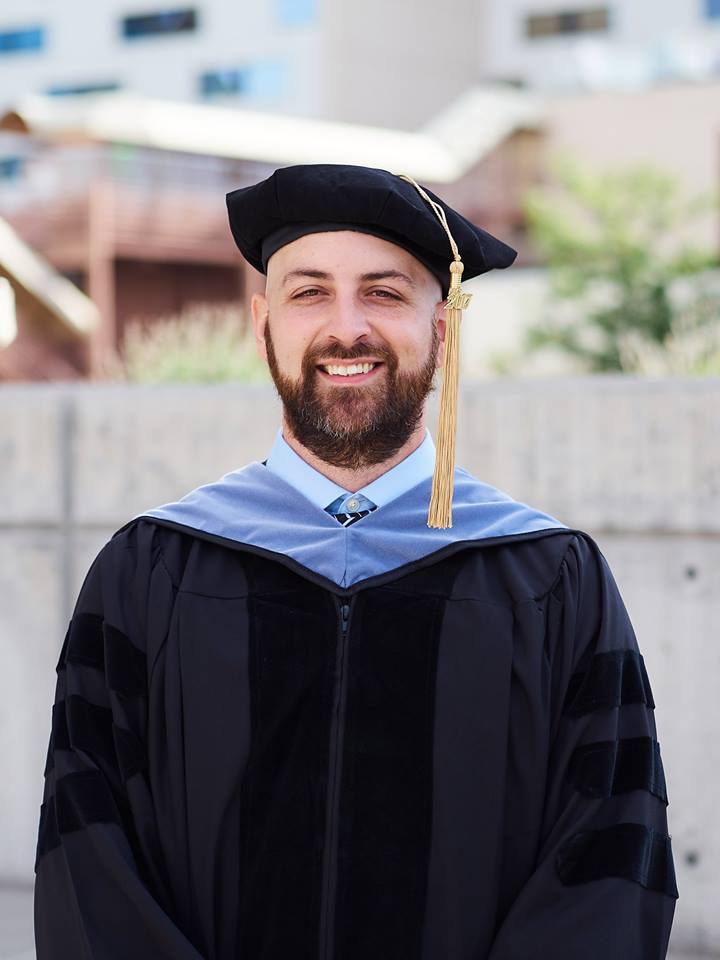
Upon graduating high school, two years after 9/11, James Wersal joined the US Army. He spent two rigorous years at Wentworth Military Academy and commissioned as a 2nd Lieutenant at 20 years of age due to an early commissioning program. Military service and the duties that come along with being responsible for the safety and well-being of troops, civilians and millions of dollars’ worth of equipment, have developed his leadership skills resulting in a promotion to Captain. After his service, he completed a master’s degree in Occupational Therapy in 2013 and recently began pursuing a doctoral degree in rehabilitation science at the University of Florida as this will enable him to research military health and provide clinical skills to veterans.
“Transitioning to the healthcare field was directly related to my experiences in the military,” he said. “I was exposed to how meaningful occupational therapy was to my friends that went through the Wounded Warrior Program by promoting independence through client-centered and occupational-based interventions.”
In 2013, James began providing occupational therapy services which gave him a lot of hands on experiences and kindled his passion for the profession. Through a traveling occupational therapist position, he worked with spinal cord injuries, neurological rehabilitation, home health, hand therapy, skilled nursing facility, and more. His clinical experiences have fueled his passion for research, to improve best clinical practices and develop expertise in neurological rehabilitation. After four years of clinical experience James, went back for a post-professional clinical doctorate in occupational therapy at Rocky Mountain University of Health Professions, which focused in administration and practice management.
At University of Florida (UF), James is focusing on rehabilitation science with a concentration in disability, occupation and participation science (DOPS). The DOPS track aims to understand the person, environment, and occupation to maximize performance in participating in meaningful activities. James also recently received a Certificate in Driver Rehabilitation Therapy, the first of its kind in the nation.
James’ doctoral advisor, Dr. Sherrilene Classen is a Professor and Chair of the Department of Occupational Therapy at UF and has been affiliated with the STRIDE Center since 2007. James said he became interested in her work because of its focus on transportation and how it relates to occupational therapy. Transportation is a major barrier in seeking healthcare treatment.
“One of the main reasons I picked UF was the transportation-based focus that Dr. Classen engages in for her research,” he said. “Specifically, as an occupational therapist serving in a neurological rehabilitation facility, I was referring people to driving evaluations but lacked the understanding of when or whether they were ready.” He said clinicians and staff at the neurological rehabilitation facility where he was previously working were missing an opportunity to develop and implement a driver rehabilitation program.

Under Dr. Classen’s mentorship, James is working on STRIDE Project D2 titled “Older Driver Experiences with Autonomous Vehicle Technology”, a collaborative, two-part project with Phase 2 beginning early in 2020. Dr. Virginia Sisiopiku of the University of Alabama at Birmingham is a co-principal investigator on the project. The researchers on this project are looking at the perceptions of older drivers from driving autonomously in a simulated environment using a driving simulator at UF with an SAE autonomous level 4. On this project, James is the study’s coordinator while at the same time collecting, collating, and analyzing data, as well as presenting the results at national conferences.
According to James, the preliminary findings for this project suggest that exposure to autonomous vehicle technology (autonomous simulator or shuttle) positively affects older drivers’ perceptions (e.g., trust, safety, intention to use, ease of use, etc.). Descriptively, exposure to autonomous shuttle has positive effects on most all areas of older adults’ perceptions with this emerging technology (trust, usefulness, ease of use, safety, control/driver efficacy, cost, authority, media, and social influence).
As for how these results will help the transportation and occupational therapy fields, he says the benefits abound. “These findings could influence educating older adults, improving industry’s deployment practices, or rolling out strategies to improve adoption practices of this emerging technology,” James said. “Specifically, it provides an opportunity for older drivers to continually engage in their community if they lose the ability to drive due to natural aging decline or disability. He added that informing healthcare providers and providing opportunities for transitional training for older drivers’ may enhance their engagement within their community by using this technology for community mobility, thus improving quality of life.
As for his involvement with the STRIDE Center James is pleased with his affiliation and expresses gratitude for providing funding for his dissertation work. His military, veteran, and health care experiences have certainly provided the tools to succeed in his doctoral program. “I believe I am a better human being because of these inflection points in my life that demanded the highest expectations which required continual growth, networking, and advancing my education, skills and experiences,” he said.